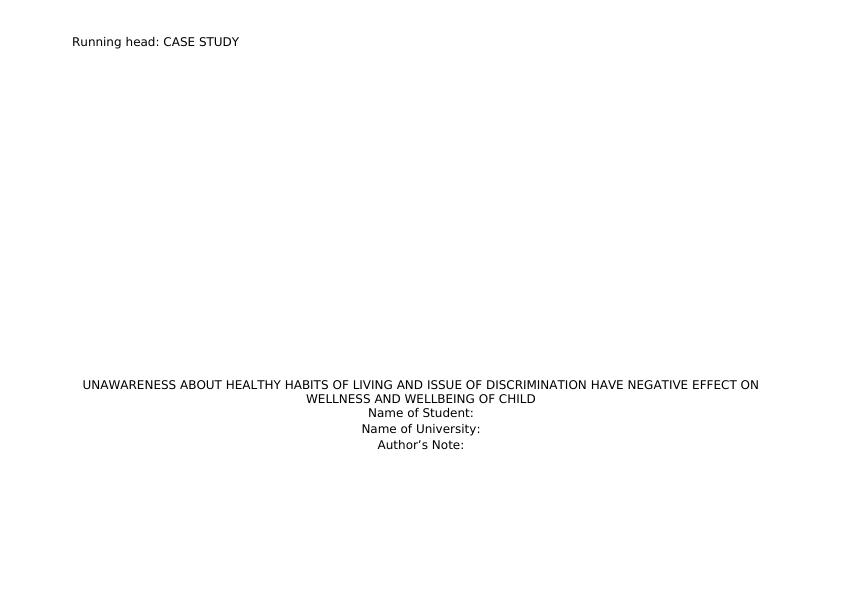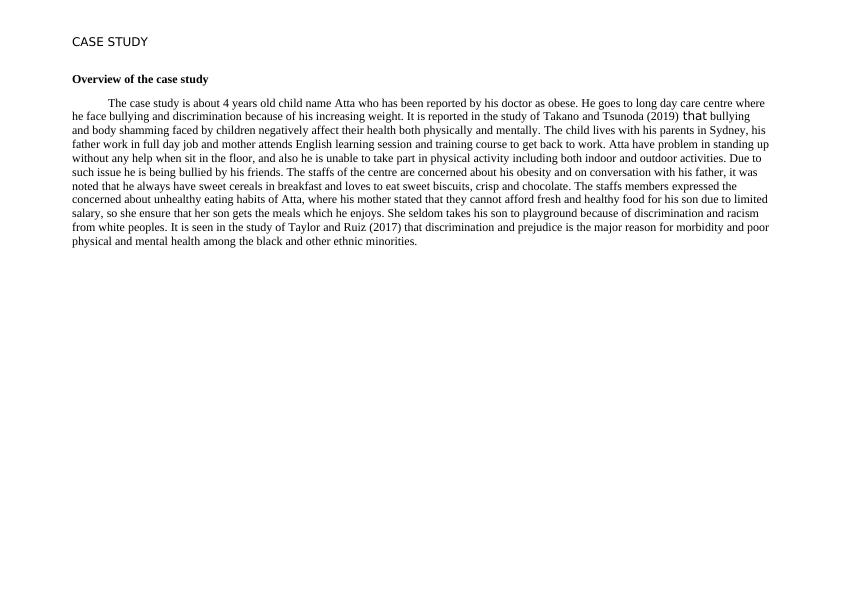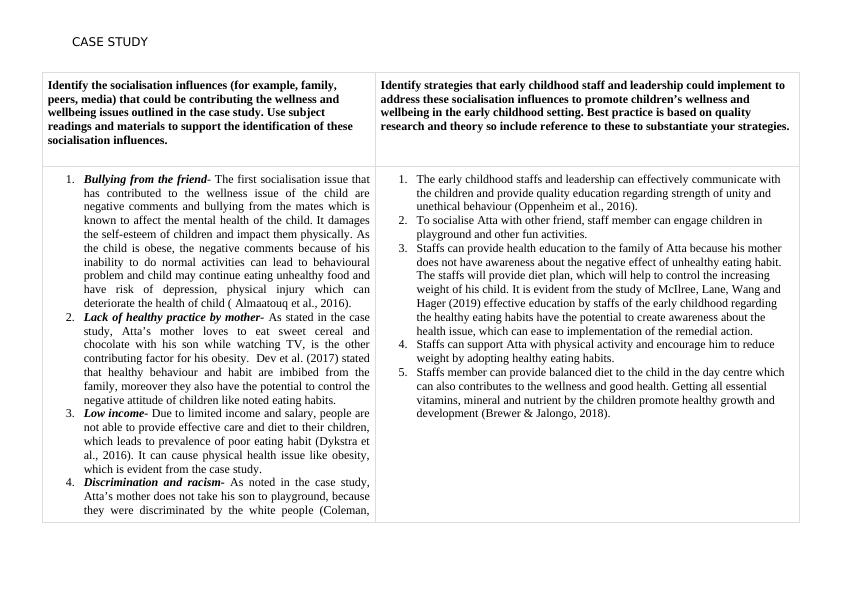Unawareness About Healthy Habbit
Added on 2022-09-18
9 Pages3077 Words29 Views
Running head: CASE STUDY
UNAWARENESS ABOUT HEALTHY HABITS OF LIVING AND ISSUE OF DISCRIMINATION HAVE NEGATIVE EFFECT ON
WELLNESS AND WELLBEING OF CHILD
Name of Student:
Name of University:
Author’s Note:
UNAWARENESS ABOUT HEALTHY HABITS OF LIVING AND ISSUE OF DISCRIMINATION HAVE NEGATIVE EFFECT ON
WELLNESS AND WELLBEING OF CHILD
Name of Student:
Name of University:
Author’s Note:

CASE STUDY
Overview of the case study
The case study is about 4 years old child name Atta who has been reported by his doctor as obese. He goes to long day care centre where
he face bullying and discrimination because of his increasing weight. It is reported in the study of Takano and Tsunoda (2019) that bullying
and body shamming faced by children negatively affect their health both physically and mentally. The child lives with his parents in Sydney, his
father work in full day job and mother attends English learning session and training course to get back to work. Atta have problem in standing up
without any help when sit in the floor, and also he is unable to take part in physical activity including both indoor and outdoor activities. Due to
such issue he is being bullied by his friends. The staffs of the centre are concerned about his obesity and on conversation with his father, it was
noted that he always have sweet cereals in breakfast and loves to eat sweet biscuits, crisp and chocolate. The staffs members expressed the
concerned about unhealthy eating habits of Atta, where his mother stated that they cannot afford fresh and healthy food for his son due to limited
salary, so she ensure that her son gets the meals which he enjoys. She seldom takes his son to playground because of discrimination and racism
from white peoples. It is seen in the study of Taylor and Ruiz (2017) that discrimination and prejudice is the major reason for morbidity and poor
physical and mental health among the black and other ethnic minorities.
Overview of the case study
The case study is about 4 years old child name Atta who has been reported by his doctor as obese. He goes to long day care centre where
he face bullying and discrimination because of his increasing weight. It is reported in the study of Takano and Tsunoda (2019) that bullying
and body shamming faced by children negatively affect their health both physically and mentally. The child lives with his parents in Sydney, his
father work in full day job and mother attends English learning session and training course to get back to work. Atta have problem in standing up
without any help when sit in the floor, and also he is unable to take part in physical activity including both indoor and outdoor activities. Due to
such issue he is being bullied by his friends. The staffs of the centre are concerned about his obesity and on conversation with his father, it was
noted that he always have sweet cereals in breakfast and loves to eat sweet biscuits, crisp and chocolate. The staffs members expressed the
concerned about unhealthy eating habits of Atta, where his mother stated that they cannot afford fresh and healthy food for his son due to limited
salary, so she ensure that her son gets the meals which he enjoys. She seldom takes his son to playground because of discrimination and racism
from white peoples. It is seen in the study of Taylor and Ruiz (2017) that discrimination and prejudice is the major reason for morbidity and poor
physical and mental health among the black and other ethnic minorities.

CASE STUDY
Identify the socialisation influences (for example, family,
peers, media) that could be contributing the wellness and
wellbeing issues outlined in the case study. Use subject
readings and materials to support the identification of these
socialisation influences.
Identify strategies that early childhood staff and leadership could implement to
address these socialisation influences to promote children’s wellness and
wellbeing in the early childhood setting. Best practice is based on quality
research and theory so include reference to these to substantiate your strategies.
1. Bullying from the friend- The first socialisation issue that
has contributed to the wellness issue of the child are
negative comments and bullying from the mates which is
known to affect the mental health of the child. It damages
the self-esteem of children and impact them physically. As
the child is obese, the negative comments because of his
inability to do normal activities can lead to behavioural
problem and child may continue eating unhealthy food and
have risk of depression, physical injury which can
deteriorate the health of child ( Almaatouq et al., 2016).
2. Lack of healthy practice by mother- As stated in the case
study, Atta’s mother loves to eat sweet cereal and
chocolate with his son while watching TV, is the other
contributing factor for his obesity. Dev et al. (2017) stated
that healthy behaviour and habit are imbibed from the
family, moreover they also have the potential to control the
negative attitude of children like noted eating habits.
3. Low income- Due to limited income and salary, people are
not able to provide effective care and diet to their children,
which leads to prevalence of poor eating habit (Dykstra et
al., 2016). It can cause physical health issue like obesity,
which is evident from the case study.
4. Discrimination and racism- As noted in the case study,
Atta’s mother does not take his son to playground, because
they were discriminated by the white people (Coleman,
1. The early childhood staffs and leadership can effectively communicate with
the children and provide quality education regarding strength of unity and
unethical behaviour (Oppenheim et al., 2016).
2. To socialise Atta with other friend, staff member can engage children in
playground and other fun activities.
3. Staffs can provide health education to the family of Atta because his mother
does not have awareness about the negative effect of unhealthy eating habit.
The staffs will provide diet plan, which will help to control the increasing
weight of his child. It is evident from the study of McIlree, Lane, Wang and
Hager (2019) effective education by staffs of the early childhood regarding
the healthy eating habits have the potential to create awareness about the
health issue, which can ease to implementation of the remedial action.
4. Staffs can support Atta with physical activity and encourage him to reduce
weight by adopting healthy eating habits.
5. Staffs member can provide balanced diet to the child in the day centre which
can also contributes to the wellness and good health. Getting all essential
vitamins, mineral and nutrient by the children promote healthy growth and
development (Brewer & Jalongo, 2018).
Identify the socialisation influences (for example, family,
peers, media) that could be contributing the wellness and
wellbeing issues outlined in the case study. Use subject
readings and materials to support the identification of these
socialisation influences.
Identify strategies that early childhood staff and leadership could implement to
address these socialisation influences to promote children’s wellness and
wellbeing in the early childhood setting. Best practice is based on quality
research and theory so include reference to these to substantiate your strategies.
1. Bullying from the friend- The first socialisation issue that
has contributed to the wellness issue of the child are
negative comments and bullying from the mates which is
known to affect the mental health of the child. It damages
the self-esteem of children and impact them physically. As
the child is obese, the negative comments because of his
inability to do normal activities can lead to behavioural
problem and child may continue eating unhealthy food and
have risk of depression, physical injury which can
deteriorate the health of child ( Almaatouq et al., 2016).
2. Lack of healthy practice by mother- As stated in the case
study, Atta’s mother loves to eat sweet cereal and
chocolate with his son while watching TV, is the other
contributing factor for his obesity. Dev et al. (2017) stated
that healthy behaviour and habit are imbibed from the
family, moreover they also have the potential to control the
negative attitude of children like noted eating habits.
3. Low income- Due to limited income and salary, people are
not able to provide effective care and diet to their children,
which leads to prevalence of poor eating habit (Dykstra et
al., 2016). It can cause physical health issue like obesity,
which is evident from the case study.
4. Discrimination and racism- As noted in the case study,
Atta’s mother does not take his son to playground, because
they were discriminated by the white people (Coleman,
1. The early childhood staffs and leadership can effectively communicate with
the children and provide quality education regarding strength of unity and
unethical behaviour (Oppenheim et al., 2016).
2. To socialise Atta with other friend, staff member can engage children in
playground and other fun activities.
3. Staffs can provide health education to the family of Atta because his mother
does not have awareness about the negative effect of unhealthy eating habit.
The staffs will provide diet plan, which will help to control the increasing
weight of his child. It is evident from the study of McIlree, Lane, Wang and
Hager (2019) effective education by staffs of the early childhood regarding
the healthy eating habits have the potential to create awareness about the
health issue, which can ease to implementation of the remedial action.
4. Staffs can support Atta with physical activity and encourage him to reduce
weight by adopting healthy eating habits.
5. Staffs member can provide balanced diet to the child in the day centre which
can also contributes to the wellness and good health. Getting all essential
vitamins, mineral and nutrient by the children promote healthy growth and
development (Brewer & Jalongo, 2018).

End of preview
Want to access all the pages? Upload your documents or become a member.
Related Documents
Impact of family influence on children’s health and well-beinglg...
|6
|3012
|21
PSYCHOLOGY. 1. WELLNESS AND WELLBEING Student’s Name Prlg...
|13
|3072
|22
Self-care recovery journeylg...
|12
|2941
|322
Intervention Plan for Children's Wellbeing in a Case Studylg...
|12
|3197
|181
Primary Education Essay 2022lg...
|7
|2227
|32
Ecological System Theory: A Critical Review Essaylg...
|10
|1063
|322
